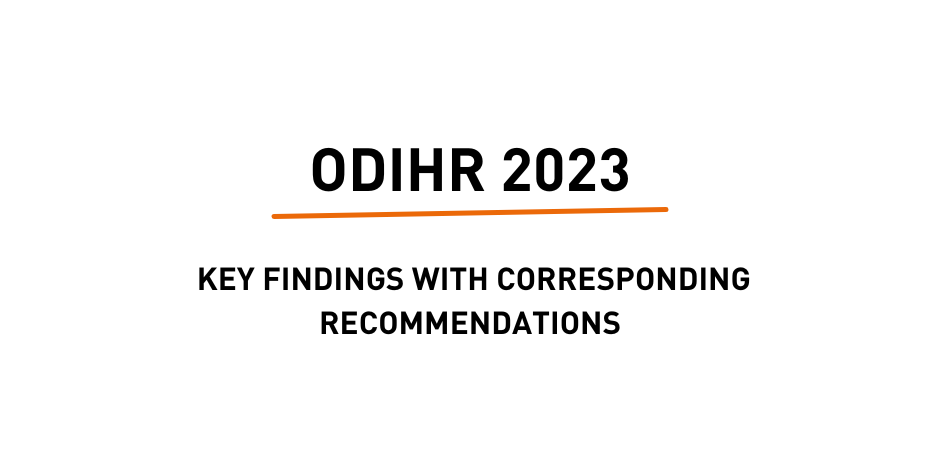ODIHR 2023 – Key findings with corresponding recommendations

BLURRED LINE BETWEEN THE STATE AND THE PARTY
Finding: “dominated by the decisive involvement of the President, which, together with the ruling party’s systemic advantages, created unjust conditions”
Finding: “pressure on public sector employees, misuse of public resources, and voter inducement schemes raised concerns about voters’ ability to make a choice free from undue pressure. These practices … tilted the playing field, and blurred the line between state and the party, at odds with international standards and paragraph 5.4 of the 1990 OSCE Copenhagen Doc.“
REC. Priority: The law should provide for a clear separation between the official functions and campaigning activities of the incumbents. Authorities should take measures to prevent misuse of office and state resources, and any violations should be proactively addressed through proportionate and dissuasive sanctions.
REC. Priority: Authorities should prevent intimidation and pressure on voters, including employees of public and state institutions and enterprises, and strengthen the oversight mechanisms.
REC. Other: To ensure equal campaigning conditions, authorities should implement measures that fully enforce the right of all electoral stakeholders to access and use public premises for campaigning on equal terms.
FREQUENCY OF EARLY ELECTIONS AND LACK OF POLITICAL WILL HAMPER ELECTION REFORM
Finding: “frequency of early elections has further eroded public confidence in the functioning of democratic institutions and together with the lack of political will left needed reforms unaddressed.”
REC. Priority: To effectively address recommendations outlined in this and prior ODIHR election observation reports, necessary legislative amendments should be initiated well in advance of the next elections through an inclusive consultative process built upon a broad political consensus.
VOTER REGISTRY COMPROMISED
Finding: “limited mechanisms to effectively scrutinize the UVR and the absence of detailed data on changes in permanent and temporary registration as well as allegations of numerous deceased persons remaining on the register and claims of large-scale voter migration in relation to local elections significantly eroded public trust in the UVR’s accuracy. This limited confidence was further exacerbated by a lack of a comprehensive response to these concerns from authorities.”
REC. Priority: To address concerns over the accuracy of voter lists and increase public confidence, the relevant laws, regulations, and practices should be reconsidered to enable access to voter registration data and facilitate the conduct of a meaningful audit of the Unified Voter Register with the participation of relevant stakeholders, including political parties and civil society, in line with data protection standards.
INFORMED CHOICE DETRACTED FROM CITIZENS (MEDIA BIAS)
Finding 1: “campaign was marred by harsh rhetoric, bias in the media, pressure on public sector employees and misuse of public resources.”
Finding 2: “most national broadcasters lacked genuine analytical reporting, detracting from the voters’ ability to make an informed choice. “
REC. Other: To provide impartial information about the contestants and allow voters to make an informed choice, the media should exercise their right for editorial independence and avoid using material produced by parties in news and information programmes, especially during election campaigns.
HARMED FREEDOM OF EXPRESSION, INTIMIDATION OF JOURNALISTS AND HUMAN RIGHTS DEFENDERS
Finding 1: “a number of concerns about the respect for freedom of expression and cases of intimidation and harassment of civil activists, other human rights defenders, and journalists, remained unresolved.”
Finding 2: “authorities and pro-government media publicly accused the organization of destabilizing the country’s constitutional order.”
REC. Other Media: The competent authorities should fulfil their duty to protect the safety of media staff through effective and timely measures, including promptly investigate and bring to justice those involved in attacks on, and ill-treatment of journalists and other media actors, as well as publicly condemn all threats against journalists.
REC. Other: Authorities should guarantee adequate conditions for both citizen and international observers to conduct their activities with unimpeded access to all election-related information in a timely manner and in an environment free from pressure and intimidation, in line with Serbia’s international commitments.
LACK OF OVERSIGHT AND REGULATORY RESPONSE
Finding: “oversight bodies for campaign and electronic media remained largely ineffective in deterring violations during the election period.”
REC. Priority: The independence of the Electronic Media Regulatory Authority (REM) should be effectively guaranteed, in line with the new legal provisions. The REM should proactively use its legal powers to act ex officio on violations of media regulation, based on its systematic monitoring.
LIMITED VOTER EDUCATION
Finding: “scope of voter education was limited”
REC. Priority: To enhance the effective exercise of voting rights, the Republic Electoral Commission should develop and implement a timely, comprehensive and targeted voter education programme, including on voters’ rights, the prevention of group voting, and the importance of voting by secret ballot.
LIMITED CAPACITIES OF ELECTION ADMINISTRATION
Finding 1: “Contrary to previous ODIHR recommendations, participation in the training for Polling Board (PB) members was not mandatory.”
Finding 2: “the REC largely enjoyed confidence in its technical capacity as well as improved communication and transparency, however, its lack of a permanent secretariat, along with limited human and financial resources, hinders its ability to sustainably improve its work between electoral periods.”
REC. Priority: As previously recommended, to ensure consistent application of election day procedures and enhance the professional capacity of the election administration, standardized mandatory training could be considered for all Local Electoral Commission and Polling Board members and prospective members, including the extended compositions of these bodies.
REC. Other: To achieve sustainable progress in its activities, such as developing instructions, training election officials, improving voter education campaigns, and enhance the accessibility of the electoral process, the Republic Electoral Commission should be granted sufficient administrative and technical capacity, including its own permanent secretariat.








